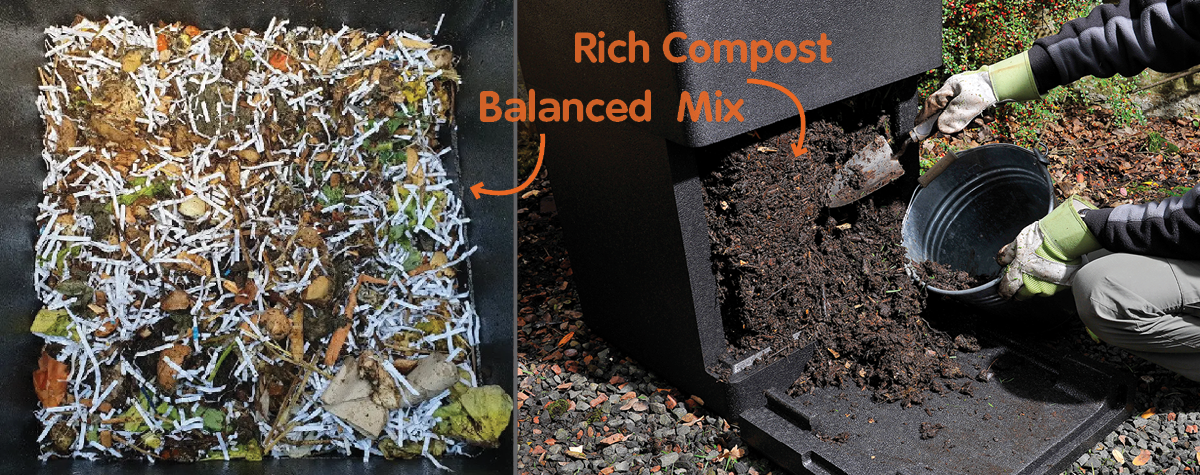One of the most read HOTBIN FAQ is still related to the waste inside the composting bin being wet and customers wanting to fix the problem.
This is a common occurrence, and in most cases, easy to fix by revisiting our user manual and watching a few of our YouTube videos on the subject.
We understand that the advice below might not match your past composting experience(s). However, we recommend that you stick with us, as this advice is based on the fundamental laws governing hot composting, and it works. Once grasped, you will find the HOTBIN easy to use forever.
If you notice that the outside thermometer of your HOTBIN is outside the ‘green zone’ or reading less than 104° F, we suggest the following steps:
- Verify the internal temperature of the waste by opening the lid and placing the ‘extra’ thermometer (provided with your bin) on top of the composting heap.
- If the internal temperature is around or above 104°F and the heap was steaming when opening the lid, you have no problem. Close the lid and add a new batch of waste as you previously planned.
- If the internal temperature in the top layer does not increase above 86-104°F, your waste is too wet and needs to be re-balanced to re-start the composting cycle.
What does ‘too wet’ for hot composting mean?
Simply put, it means that there is more water in the food/garden waste inside the bin, than energy (calories/heat) required to evaporate the moisture as water vapor, decompose waste and produce compost.
Unless you balance the wet mix, the waste will not get above 104°F and the HOTBIN will not decompose as it was designed to do. Furthermore, the waste inside the bin will turn smelly and you will be experiencing a good amount of leachate draining from the base or through the liquid fertilizer’s drainage.
Important Tip
Always investigate and fix excess water issues – the sooner you address it, the easier it is to fix. Sorting out an anaerobic (sans air) smelly mush of partly composted food waste is just about the worst composting job there is.
How do I fix (balance) waste that is 'too wet'?
- Add dry ‘easy to digest and absorb’ materials to your waste mix such as shredded office paper or corrugated cardboard. They will help absorb excess moisture.
- Avoid adding newspaper or cereal packet card for this task. They are not easy for bacteria to digest and will just end up as a mushy lump in your final compost.)
- For information on shredded paper to wet/food waste ratios view our article on Balancing the Composting Act.
- Add a bulking agent (mulch/woodchips). This should always be added with all waste to aid airflow within the HOTBIN and keep the waste decomposing aerobically (air).
- NOTE: The role of shredded paper is to balance the moisture content in the waste; and the role of the bulking agent (mulch) is to create a structure on waste to maintain aeration. Both are essential to hot compost effectively and cannot be interchanged.
- Lots of liquid fertilizer (brown liquid) leaking from the mesh plate.
- Lots of water dripping off the inside of lid when it is opened.
- The waste in the HOTBIN smells putrid, rancid or drain like (signs of anaerobic decomposition)
- The temperature in the top layer does not increase above 86-104°F.
NOTE: Poor aeration and a lack of new batches of waste also prevents the temperature from rising above 104°F (as well).
Compost Magazine wrote a study on HOTBIN Composting in 2019, that included product testing and dozens of customer reviews. I find this study extremely relevant to this article, as it stresses the importance of having a balanced mix of waste, shredded paper and wood chips/mulch to achieve success. Link to full article.
In the article, Compost Magazine concludes that HOTBIN is exceedingly easy to achieve hot compost. However, they recommend following HOTBIN guidelines, at least, until the user has harvested rich compost more than once, and is familiar with the unit.













